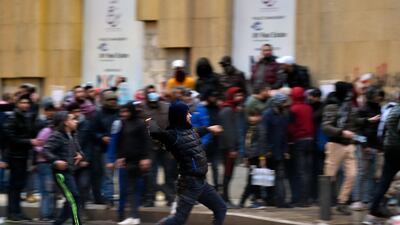Lebanon’s new government, headed by Hassan Diab, was last week weaved together by Jamil Al Sayyed – a man known for his loyalty to Syrian President Bashar Al Assad, Lebanese political party Hezbollah and the Iranian regime. In other words, the new government is part of Tehran’s so-called Axis of Resistance. However, most of the powers vested in the region have preferred to wait and watch to see how this government is getting on.
The Europeans have sent misleading diplomatic messages at a time when they need to be clear and firm. UN Secretary General Antonio Guterres has been guilty of the same. For now, Russia has focused on its interests in Syria and Libya.
The US meanwhile has determined not to tolerate Hezbollah’s role as a puppet master controlling the strings of what is essentially a weak government. The Donald Trump administration’s policy with regard to Iran and its proxies in the Middle East has always been to exert maximum pressure, including the deployment of sanctions.
While the Lebanese state has not been targeted by sanctions thus far, the imposition of a Hezbollah-backed government will have consequences in Washington. And anyone who assumes that the Trump administration will accept the status quo will be in for a surprise.
For now, though, the US is biding its time – not because it thinks it might get on with Mr Diab, who has denied his administration is the work of Hezbollah. Nor is it doing so to test the government’s ability to enact serious reforms – a condition for giving Lebanon aid to stave off collapse. The US is essentially ensuring that the Lebanese army does not slip into a bloody confrontation with peaceful protesters, and guarantee donor countries do not rush to offer aid before reforms are put into execution – for that would mean sparing Lebanon’s ruling elite of accountability.
European diplomats have spoken in a language that betray the Lebanese people and their demands. They have suggested that the mere formation of a government, even if three months too late, is an achievement and that there should be no prejudgment before its performance is evaluated. This stance is even more remarkable given that it has coincided with the UK’s decision to stop differentiating between Hezbollah’s military and political wings and designate the entity as a terrorist group. Yet we see now the UK implicitly deciding to live with a government formed by Hezbollah.
Such a stance will hasten Lebanon’s economic collapse. Firstly, giving the government a grace period of a month or two – which the Europeans are considering as an option – might delay an implosion in the short term, when what is needed is to force rapid reforms to prevent collapse over the long term. Secondly, the European stance will be seen as a betrayal of the popular uprising, which has demanded the formation of a government of technocrats and independents.
French diplomacy, meanwhile, needs a skillful translator to interpret its meanings, having linked aid to reforms; welcomed the formation of the government; and criticised Hezbollah’s regional positions while calling for its “self-dissociation”.
More remarkable still is Hezbollah's position, as described by those close to the party. In Hezbollah-aligned Al Akhbar newspaper, its editor-in-chief Ibrahim Al Amin wrote: "Hezbollah will dissociate itself from everything but will not allow anyone in the government to threaten the interests of the resistance whatever the cost." He added that defeating what he called the US-Israeli project is the priority, and that "every setback for America will mitigate the internal crises of Lebanon and other countries in the region".

This clarity comes in the wake of some ambiguity expressed by Mike Pompeo, the US secretary of state. Speaking to Bloomberg about the US position on the Lebanese government, he said: "We'll have to take a look at it. I don't know the answer to that yet." In reality, however, the Trump administration's position is crystal clear, with Mr Pompeo having attached conditions before providing assistance to Lebanon to save it from a "terrible financial crisis that lays in front of it just in the weeks ahead", as he put it. Those conditions included the state meeting the demands for freedom and sovereignty.
Interestingly, those close to Hezbollah’s thinking are speaking in a manner that suggests they are disapproving of Mr Diab’s government. Criticism emerged after Mr Diab ruled out dismissing Central Bank governor Riad Salameh, announced his first foreign visit would be to the Arabian Gulf, and refrained from promising to uphold the trinity of the “army, the people, and the resistance” enshrined in all previous government manifestos.
So, the question we must ask here is this: is Hezbollah’s distancing from the Diab government an attempt at deflection, or is it to distance itself from a disaster it knows is coming – precisely because of its insistence on forming a weak government and thereby ignoring the people’s demands? Ultimately, what matters to Hezbollah is not what happens to Lebanon but how Lebanon can be used in the battle between Iran and the US.
However, Tehran is in a bind – both in economic and military terms. It has also fallen victim to its own regional and nuclear ambitions. The Trump administration will therefore continue to impose sanctions on the regime and its proxies. It has stepped up efforts to target Hezbollah’s funding sources in South America and Africa. And if necessary, it might even impose sanctions on Beirut.
In other words, those rushing to conclude that the uprising in Lebanon is over should hold their horses.
Raghida Dergham is the founder and executive chairwoman of the Beirut Institute


